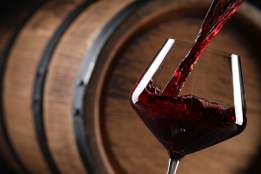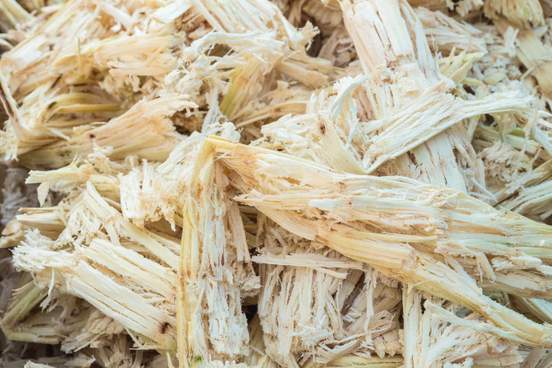
Bagasse
Definition:
noun : plant residue (as of sugarcane or grapes) left after a product (such as juice) has been extracted
Background:
Bagasse is often used specifically for the crushed juiceless remains of sugarcane, but can be applied to similar plant residue remaining after the extraction of juice (as from sugar beets or grapes_, an oil (as from olives), or a fiber (as from sisal). It is not used for someone acting foolish, say, wearing a bag over their head, or on their duff. Bagasse came to English from French (same spelling) which in turn came from the Spanish word bagazo.
Example:
The burning of bagasse, the brownish fibrous residue from sugar cane, began in the early 1970s when the Environmental Protection Agency ordered a halt to the dumping of 2.7 million tons of cane waste per year into the Pacific Ocean.
—Sara C. Medina, Time, 20 Sep. 1982

Medrick
Definition:
noun : a small gull or tern
Medrick sounds like it could be an excellent put-down, like a cross between the Yiddish-derived words nudnik and nebbish, but alas, it refers to a small tern (some sources suggest the common tern, specifically) or gull. The origins of medrick are also as-yet unknown, except that records of its use are chiefly from the northeastern United States.
Example:
Medrick, waving wide wings low over the breeze-rippled bight;
Osprey, soaring superb overhead in the fathomless blue,
Graceful and fearless and strong, do you thrill with the morning’s delight
Even as I? Brings the sunshine a message of beauty for you?
— Celia Thaxter, “Medrick and Osprey,” The Poems of Celia Thaxter (Houghton Mifflin Company, 1914)

Klaberjass
Definition:
noun: a two-handed game played with 32 cards in which a player scores by holding a higher sequence than his opponent, by holding both the king and queen of trumps, by taking the last trick, and by taking scoring cards in tricks
Background:
If we went solely on vibes (note: we do not ever go solely on vibes), we might think klaberjass referred either to nonsense or someone talking nonsense, as in “Cut it out with that klaberjass, klaberjass!” Instead, we know that klaberjass is a card game that also goes by many additional names, including clabber, clob, clobber, jass, klab, and klob, all of which could presumably do as a choice epithet in a pinch. And if that weren’t enough, the word schmeiss refers to a bid in klaberjass that requires the opponent to accept the bidder’s trump suit or abandon the hand.
Example:
This popular and widespread two-hander has so many names, mostly variations on the same one, that it is hard to know which is best for universal recognition. Klaberjass is probably closest to the original.
— David Parlett, The Penguin Book of Card Games (Penguin Books Limited, 2008, orig. pub. 1979)
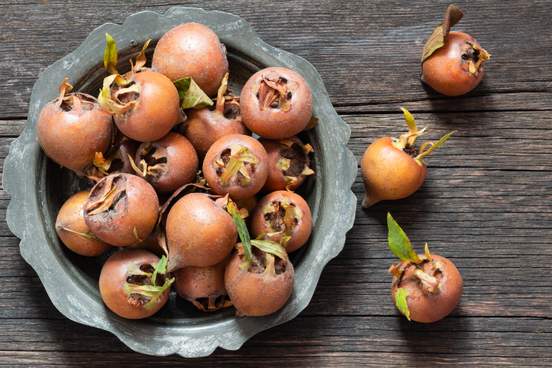
Medlar
Definition:
noun: a small deciduous Eurasian tree (Mespilus germanica) of the rose family whose fruit resembles a crab apple and is used in preserves; also : its fruit
Background:
The roots of medlar have naught to do with those of meddle, as in “I’d have gotten away with it if it hadn’t been for those meddling kids.” The latter comes from the Latin verb miscēre, meaning “to mix,” while medlar traces back to the Greek word for the odd fruit, mespilon. Rather than being an insult itself, the medlar has instead been the butt of nomenclatural humor for centuries, with its distinctive look leading to nicknames including (deep breath) “open arse.”
Example:
Before my own return home, I took a final stroll in the courtyard of Saint Antony’s and noticed a large tree laden with fruit, little buff spheres apparently splitting open at the bud end. They were medlars, those ancient European fruits now mostly forgotten because they can’t be eaten out of hand even when they're fully ripe.
— Raymond Sokolov, Natural History, Dec. 1991
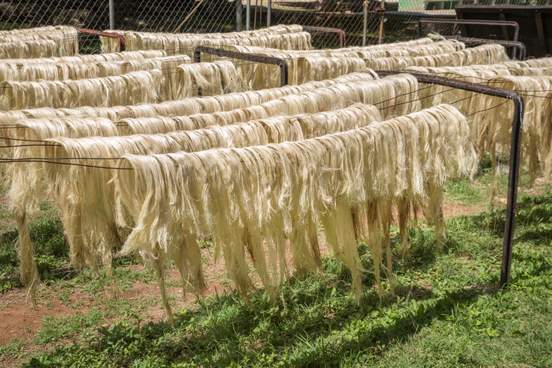
Raspador
Definition:
noun: a machine for decorticating or scraping fiber of henequen or sisal
Background:
There’s something rakish and roguish about raspador that we could envision leading to synonymity with rapscallion or rascal, if only it doesn’t refer to a decorticating machine. But maybe there’s a rascally machine out there scraping henequen fiber in a mischievous way?
Example:
The Raspador machine consists of a cast iron wheel with a broad flat rim (or a drum) to which angle iron (or steel) blunt knives/blades of suitable height are fixed (or welded) on the periphery.
— S. Murali and R.K. Morchhale, “Sisal (Agave sisalana) Fibre Extraction for Sustainable Employment Generation in India,” Technologies for Sustainable Rural Development (Allied Publishers Pvt. Ltd., 2014)

Quetsch
Definitions:
noun [1]: a dry white Alsatian brandy distilled from fermented plum juice noun [2]: a vat equipped with rollers for applying chemical solutions or sizing to yarn or cloth and used especially in the slashing process
Background
If quetsch (pronounced 'kwech or 'kvech) strikes you as possibly meaning “a habitual complainer,” you’re not far off, at least for one of the two homonyms. The quetsch referring to a vat with rollers comes from the same Middle High German word, quetschen (“to strike”), that led to the Yiddish kvetshn, which became kvetch in English. The other quetsch comes from quetsch or quetsche, a word meaning “plum” in an Alsatian dialect of German.
Example:
An hour later Schmidt sat drinking a glass of Quetsch, smoking a cigar, as he had done years before…
— May Sarton, The Bridge of Years (Norton, 1985, orig. pub. 1946)
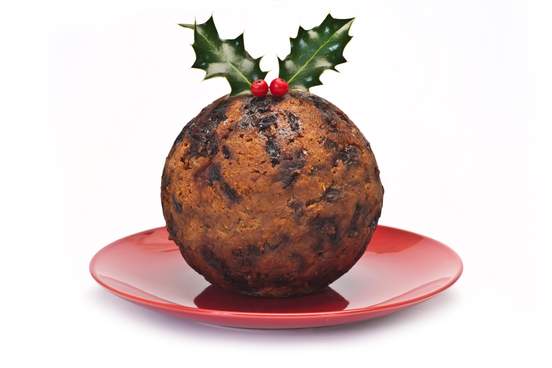
Plum duff
Definition:
noun : a steamed or boiled plain flour pudding usually containing raisins or currants
Background:
Speaking of plums, behold plum duff, which is not “plum + the duff that means ‘buttocks’” but rather “plum + the duff that means ‘pudding.’” The figgy pudding duff is a dialectical alteration of dough, while the origins of the cheeky duff are unknown.
Example:
They were both down in the cabin, and Bunny was making believe he was very hungry and he was asking Sue to bring him some more “plum duff” when the little girl gave a sudden cry. “What’s the matter?” asked Bunny.
— Laura Lee Hope, Bunny Brown and His Sister Sue at Christmas Tree Cove (Grosset & Dunlap, 1920)
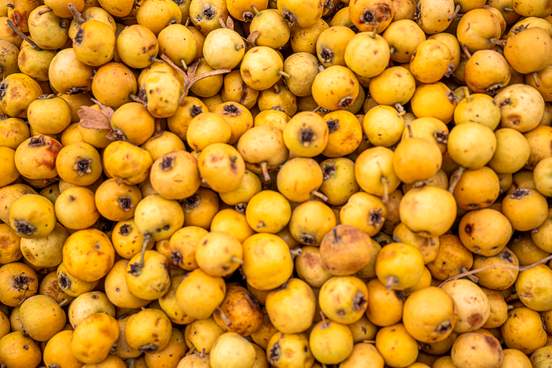
Azarole
Definition:
noun: the fruit of a shrub (Crataegus azarolus) of southern Europe
And speaking of medlars, the fruit (and its tree) known as azarole, despite belonging to the hawthorn genus, is sometimes referred to as a “Mediterranean medlar” for its similar appearance. You may want to ask for them that way, rather than shouting “Hey, azarole!” at your greengrocer.
Example:
Stradivarius preferred maple to any other wood, but he went with the times and also employed the woods favoured by his brethren, such as poplar, lime, and even grained pine. A species of red pine, common to the Tyrol, and known to the Italian makers by the name of “Azarole,” was more in favour with the Cremona luthier than Swiss pine.
— Olga Racster, Chats on Violoncellos (T. Werner Laurie, 1907)

Slobgollion
Definition:
noun: a substance derived from spermaceti
Background:
Slobgollion is, alas, not defined in our dictionary, though we do define slubberdegullion (“a dirty rascal”) and slumgullion (“a meat stew”). Slobgollion is neither of those, however, as made clear in Herman Melville’s Moby-Dick, which paints about as vivid a picture of the spermaceti-derived substance as anyone could hope for, probably forever.
Example:
There is another substance, and a very singular one, which turns up in the course of this business, but which I feel it to be very puzzling adequately to describe. It is called slobgollion; an appellation original with the whalemen, and even so is the nature of the substance. It is an ineffably oozy, stringy affair, most frequently found in the tubs of sperm, after a prolonged squeezing, and subsequent decanting. I hold it to be the wondrously thin, ruptured membranes of the case, coalescing.
— Herman Melville, Moby-Dick (Harper & Brothers, 1851)
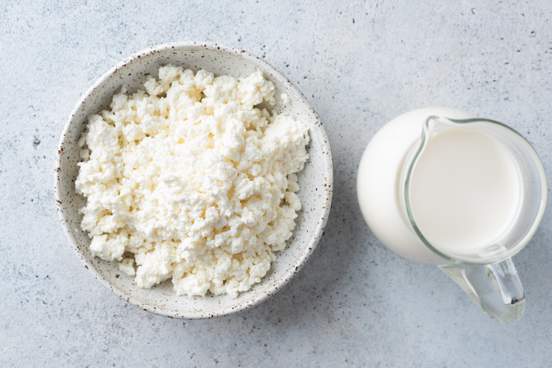
Smearcase
Definition:
noun: cottage cheese
Background:
In certain parts of the country (namely the east central part) you may hear the comely comestible most often called cottage cheese referred to instead as smearcase. So if you’re hanging out in any part of the broad midland region and hear talk of “smearcase,” there’s no need to take offense. In fact, as demonstrated in the example below by one rhapsodic smearcase enthusiast, there is rather much reason to rejoice. Smearcase is a modification of the German Schmierkäse, itself a combination of schmieren (“to smear”) and Käse (“cheese”).
Example:
On our dairy farm in Maryland, where good dairy products are turned out, I feel I am a real judge of dairy products. Back home we can make good smearcase; but this Springfield smearcase lady who vends it in the public market can make it better than we can at home. Maryland smearcase is drained until it is fairly dry and granular, and when sold is moistened with a certain amount of cream. It is perfectly smooth, has no lumps and is semi-liquid. It is brought to market in great jars holding five or six gallons each and is placed in small paper carriers similar to those used for ice cream. Each carrier has a small wire handle like a bucket handle. The package is a great improvement over the old method of requiring the purchaser to bring a dish or bucket. I cannot describe the flavor except to state that a slight acid taste is apparent. Its consistency is slightly frothy, which would indicate that is had undergone a beating process.
— W. E. Curley, The American Agriculturist, 9 June 1917
